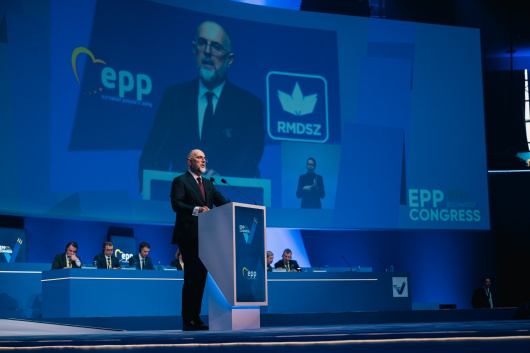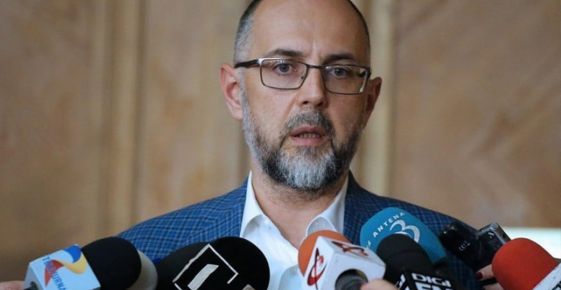Kelemen Hunor's letter to the embassies in Romania regarding The Day of Truth (Mikó Case)
As President of the Democratic Alliance of Hungarians in Romania, which represents the 1,5 million Hungarians from Romania, it is my duty to draw into your attention a highly disputed court ruling in Romania concerning the property right of the Hungarian community, specifically the Reformed Church, over a more than a century old high school building in Sepsiszentgyörgy (Sfântu Gheorghe, Romania). Recently, by means of a politically motivated decision the Romanian judiciary renationalized the Székely Mikó Kollégium (Székely Mikó High School), which was rightfully returned to the Reformed Church in 2002. In 2002, two families filed a lawsuit against the Reformed Church and the local government, claiming that the church had never been the owner of any of the buildings. The lawsuit continued until 2006, when the court made a final ruling, declaring that all the buildings were the property of the Church. On March 15, 2006, after the conclusion of the civil action, the families filed a criminal suit against 7 people. After the criminal complaint the Anti-Corruption Department of the Office of the General Prosecutor took over the investigation and accused all the three members of the Restitution Committee of abuse of authority. Two of the three members of the Committee, Attila Markó and Tamás Marosán, were sentenced to three years of prison. The third member of the Committee, Silviu Clim, was sentenced to three years of suspended imprisonment. An appeal was filed and will be judged on the 5th October, 2012 at the Appeal Court Ploieşti. The sentence will be final and irrevocable.
Recalling the recent history of Romania, following the fall of the communism, one of the most important aims of the Hungarian community from Romania was to recover confiscated lands, forests, church and community properties. Creating the legal background for this process has not been easy. Proving property rights under the law has not been a smooth process. It has not been completed and the definitive restitution itself is far from being free of contradictions. In spite of this, the past fifteen years were marked by a series of gratifications and the property restitution process is still not over.
The ruling of the Court has several legal, social and community consequences. While it is based on misjudgement, it cannot be considered (either) independent, or free of pressure. We consider the sentence is a serious threat and attack against the whole Hungarian community in Romania. We consider that each Hungarian individual was sentenced to 3 years of imprisonment, because our whole community aimed the restitution of the properties after five decades of communist regime. Thus everybody who applies the law might be condemned in future to 3 years of prison. We are back again to the times when Church and community properties were nationalized just by a signature. Such Court decisions and fake trials serve as precedents to mayors, prosecutors, and practically to anyone who would intend the restitution of formerly nationalized properties.
I would like to point out that Attila Markó is a prominent politician of the Hungarian community, member of the Democratic Alliance of Hungarians in Romania. He was the Head of the Interethnic Relations Department of the Romanian Government, during several mandates in the rank of state secretary. He is now deputy head of the same department. He is author or co-author of every minority rights provision in the Romanian legislation. He drafted and proposed the Romanian ratification of the Council of Europe’s European Charter for Regional or Minority Languages. He was member of the working group which proposed the legislative act regarding the use of the mother tongue in the public administration and the public education in mother tongue; co-author of the legislative act concerning the restitution of Church and community properties, and the adoption of the anti-discrimination legislation in Romania. Since 1998, Attila Markó was member of all restitution committees. In this capacity he made possible the restitution of more than 1.100 lands, forests and buildings to their real owners, the Churches (all religious communities, including Orthodox, Greek Catholic, Roman Catholic, Reformed, Jewish etc.)
The decision has an important message for the Hungarian community: it shows that given rights may be taken away. It also causes doubts about the independence of the Romanian judiciary, and makes people sceptical about the ability of the legal system to seek for the truth and defend their elementary rights, such as the right to private ownership. The restitution process could be stalled for good. Previously the government intended to adopt a law to abolish restitution in kind. Since the case of the High School building in Sepsiszentgyörgy is on trial, no other property has been returned despite the fact that Churches still have hundreds of such claims.
The Hungarian community from Romania is firmly protesting by all means against the abusive and irrational Court ruling. The movement already created an unprecedented unity of the Hungarians since the fall of the communism 1989, because once irrevocable, this sentence will obviously take back from the liberties and aims that the Romanian people gained at the fall of the national-communist dictatorship. We prepare a mass protest on the 1st September 2012, in front of the Székely Mikó Kollégium (Székely Mikó High School) in Sepsiszentgörgy (Sfântu Gheorghe, Romania). The slogan of our protest is „The day of the truth”. Together with political representatives, heads of all Hungarian historical churches, numerous NGOs and associations, we hope that truth will prevail and justice will triumph. The Court sentence is an attack to the fundamental rights of the individual and it is anti-European.
We ask all political and civic organisations, church leaders and other leaders, organizations, institutions and all those persons who consider this sentence irrational and abusive, targeted against the Hungarian minority from Romania to express their protest and solidarity in this abusive situation. I kindly ask you to put on your agenda, discuss and bring to public attention the information we shared with your, thus helping us enforcing the state of law and justice in Romania.



